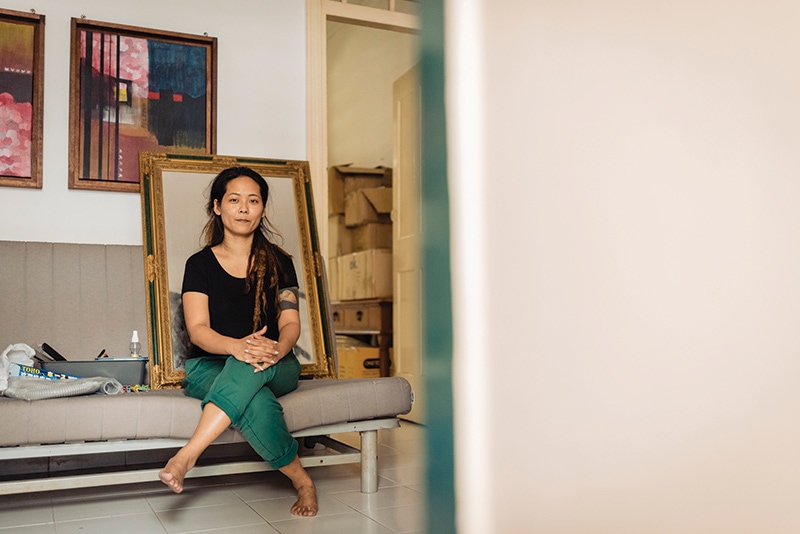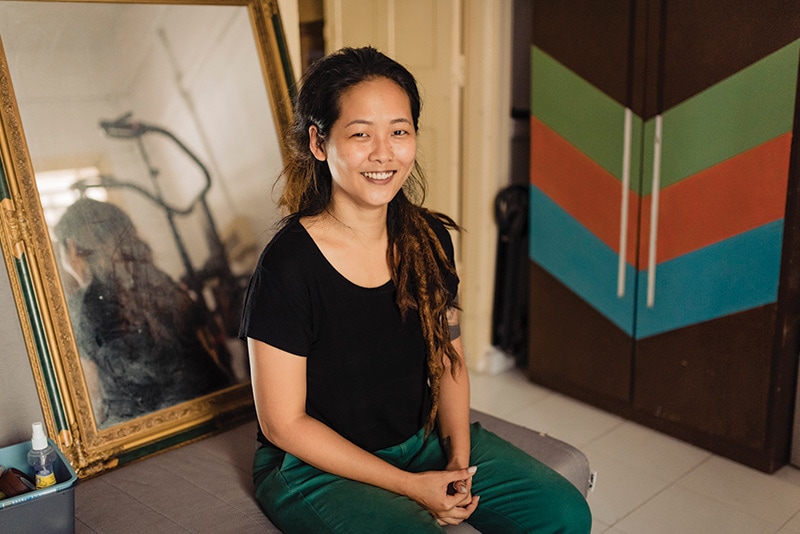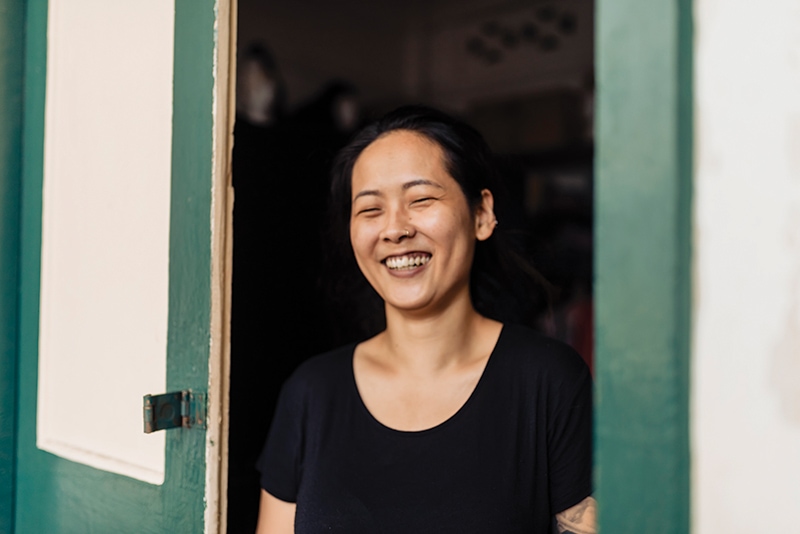Vanessa Ho on Prejudice Against Sex Workers and Upholding Their Rights
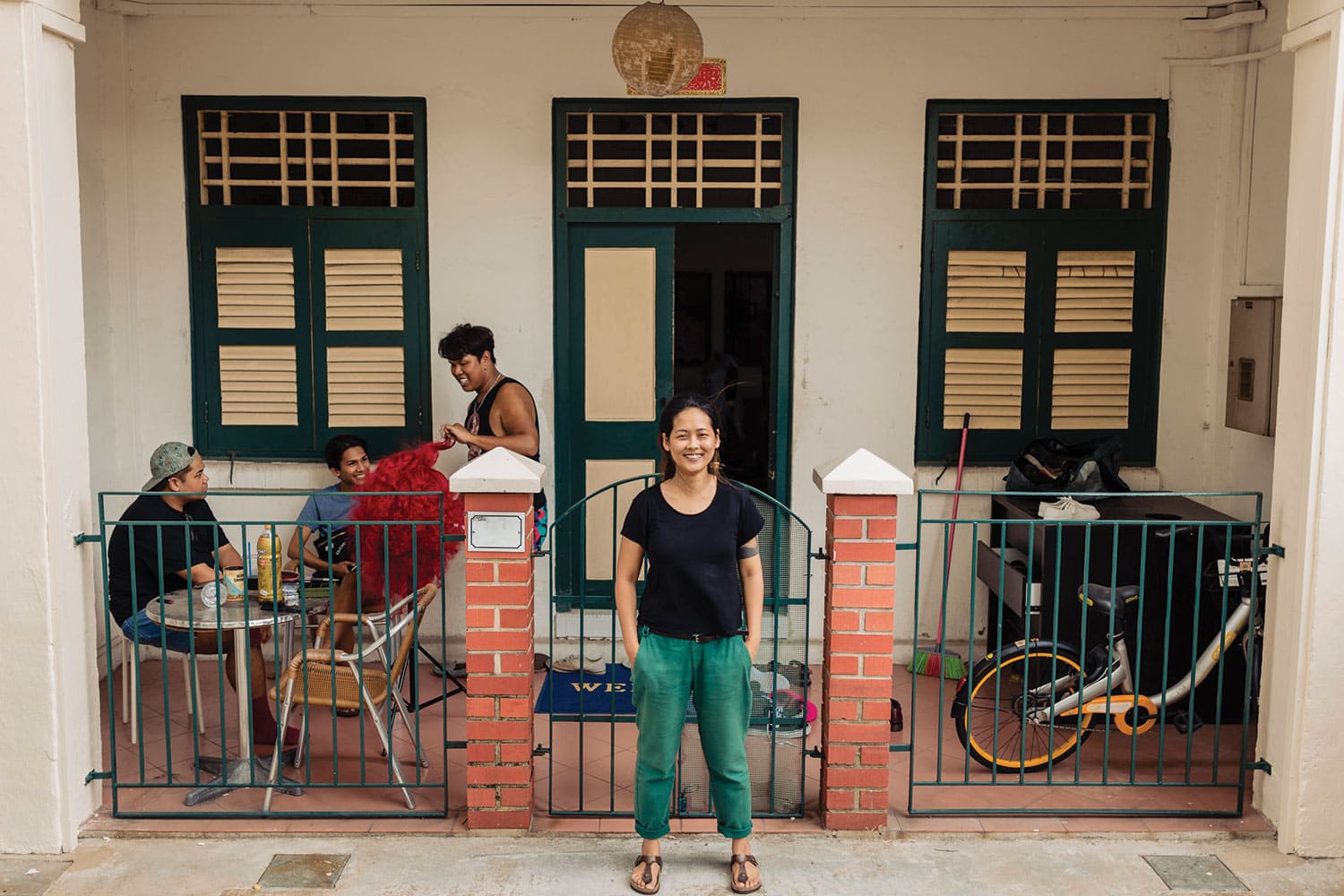
This is not my first, second, or third time visiting Project X. I remember being in their office two years ago, when I was looking for two transgender sex workers to participate in an LGBTQ+ series for SG Narratives. But here I am, struggling to locate their whereabouts, deliriously lost in the back alley of houses that look like exact replicas of each other. After more than ten minutes of walking aimlessly around in 32-degree heat, I turn a corner and spot Vanessa Ho sitting on the patio facing the road, her signature dreadlocks tumbling down her petite frame. She greets me exuberantly before promptly ushering me through the front door of this beautiful conservation building Project X calls home. The dimly lit vestibule appears to have transformed into a makeshift haberdashery of sorts with mannequins donning wigs of various colours and styles. Along the corridor, boxes of condoms are piled up, waiting to be distributed. At the shaded backyard, I’m welcomed by the sight of four team members hunched over their laptops, the soft pitter-patter of them typing away adding to the ambient noise of this otherwise bright and airy space. To call this space a mere office will be an injustice to the transformative work that happens within. The walls are adorned with various informational posters, both handwritten and some professionally printed; there's one that states what gender pronouns are and why they are important to the individual, while over in the corner, a big whiteboard chronicles the number of events organised, volunteers engaged, and yoga sessions conducted by Project X since 2017. To an outsider, these figures which run in the hundreds are impressive for a lean organisation that champions the rights of sex workers—a divisive cause not many have grown to accept. Project X was established in 2008 by Wong Yock Leng, a social worker who realised that sex workers in Singapore were among the most discriminated and marginalised members of society. Today, this non-profit is led by Vanessa who believes in a fair and safe sex industry where sex workers, including their clients, partners, and families are not discriminated against. While they also offer legal assistance to sex workers who have been mistreated or abused by their clients, Vanessa often sighs in frustration when the topic on why sex workers are still treated as less than human comes up. Although she understands that the fight exists on many levels, especially when the state of human rights in Singapore is still abysmal, she remains painfully aware that fundamentally, the inherent prejudice and bias toward sex workers is a battle waged within the hearts and minds of people.
ZAT ASTHA: How would you describe what you do to someone you’re meeting for the first time?
VANESSA HO: My job involves a lot of outreach to communities where sex workers can be found—specifically the red light districts of Geylang and Little India. I talk to the sex workers there and assist them with any family, social, or health problems they may have. I also train community leaders who are in the sex work industry—people who are interested in helping their peers and better the lives that they lead. Together with my staff, I create and initiate programmes for these leaders in the hopes that they will go back to their communities and inspire other sex workers they might come to know.
In 2017, I came up with the Human Rights Defender Programme; a 16-session programme aimed at empowering sex workers by equipping them with relevant skills to aid others in their community. I taught them about the laws in Singapore, common police procedures and practices, the rights that they have if they’re ever arrested, and HIV awareness. They also learnt counselling skills from the kind folks at the Social Service Institute, and suicide intervention from Oogachaga.
ZAT: What do you remember from your earlier days in Project X that has shaped your present-day work?
VANESSA: This is my seventh year with Project X. In my earlier days of activism, I was keen to work and partner with sex workers in Singapore. In my conversations with them, I knew I had to be mindful not to come across as wanting to change their lives or show them how to live. As it is, I have already intruded into a space that I don’t belong to, so I had to be very careful how I went about it. I made a conscious effort to understand what the community needed and what my role was in the grand scheme of things—or if my presence was even necessary in the first place.
Increasingly, I became very close to the local transgender community because a disproportionately large percentage of Singaporean sex workers are transgender. The rapport I have with them made me very vocal about transgender issues—to the point where people tend to confuse Project X with The T Project. However, even to this day, our philosophies and objectives haven’t changed. We are still a group focused on research and cultivating best established international practices. At the same time, we have always been at the forefront of issues facing the local transgender community and figuring out how best to help them with the resources that we have.
ZAT: What was your childhood like growing up, and how has it impacted the way you live?
VANESSA: I am a walking example of why meritocracy is a lie. My family and I grew up in Bishan, I went to Nanyang Primary School because my dad was an alumnus and after that, I went to Nanyang Girls’ High. Although my PSLE (Primary School Leaving Examinations) score wasn’t good enough to gain entry into Nanyang Girls’ High, the affiliation with Nanyang Primary was what got me in. I’ve always had an elite education throughout my life. Of course, when I was younger, it was not something that I immediately recognised or acknowledged. I was an extremely sheltered student who met her first Malay friend only in Junior College.
ZAT: In an interview, you mentioned that “Economics was a useless degree for me. It was a horrible, traumatic part of my education, with no application at all to my post-university life.”
VANESSA: My parents felt that there was no future in theatre, so I was forced to study economics alongside theatre in Victoria Junior College and, surprisingly, I did rather well in economics. I continued studying economics (on protest) at Warwick University after my dad refused to allow me to enrol in the theatre programme that had already accepted me. In hindsight, I wish I had taken my economics degree more seriously because, with the work I’m doing now, a significant factor that can greatly improve the lives of marginalised communities is micro-financing. I should have listened more intently during class because now, nothing makes sense to me [laughs].
After my degree, I did my masters in gender studies, which was a period of personal political awakening. The courses and programmes gave me the critical thinking skills I never had. When I came back to Singapore, I was adamant about doing work in the non-profit sector, and needed to do something that would enact social change so that there can be more equality in society. That was how I started waitressing at Post-Museum cafe (an independent cultural and social space in Singapore which aims to encourage and support a thinking and pro-active community) in Little India for very little money. I’ve always regarded Post-Museum as my activist parents, as they are constantly pushing me to do something, which was how I started organising SlutWalk.
ZAT: From my understanding, you’ve always had an ambivalent view of the Singapore Police Force. At times you come across as very scathing but, in the same breath, are quick to state that not all police officers are biased and discriminatory towards sex workers.
VANESSA: There are biases and prejudices that we, as a society, were brought up with—racism, sexism, transphobia, and classism amongst many others. As an institution that exists in our current socio-political climate, it is only natural that the police force also perpetuates some of those prejudices. For example, they keep publishing statistics that say the Malay community is disproportionately represented in drug cases in Singapore, or they question why 40% of the inmates are Malay when only 10% of the population is from that racial group. In my opinion, I think, it’s because they tend to target the Malay community. Even transgender women are disproportionately targeted. They can be sitting in a coffee shop, eating and minding their own business, and they’ll still be screened. They can be in a public park chatting with their friends, and yet be targeted.
Let me share with you what I have encountered before. I once had dinner with a group of Malay and Indian transgender sex workers, and we were seated around a table. Suddenly, seven plainclothes officers surrounded us—one officer started checking the ICs of all the sex workers and demanded that a few of them follow him. From the research I’ve done, I knew that I could ask them what was the matter and why they wanted to check these women. The minute I stood up and asked, suddenly, their attitude changed. They politely told me that it was merely a routine check and that I would not be involved. However, all the while, they were asking the sex workers I was with to stand against a wall and have their picture taken. Once the police took down their ICs, they were given a warning not to cause trouble in the area.
So why was I the only one allowed to sit down? And why didn’t they check my IC? Was my treatment different because I’m cisgender? Or is it because I’m Chinese? Or that I speak with an accent? These police officers assumed that just because I look and speak a certain way, I am innocent?
Such incidents make it very hard for me to trust the institution itself. The people inside the police force are all part of society, and inevitably, they all tend to have the same prejudices as everyone else. But the situation becomes dire when you are given the power to act upon these prejudices and biases. Of course, there are some genuinely nice people in the police force whom I see during casework and I am eternally grateful for them. And I hope that the police can one day take the lead in guiding society towards challenging these unconscious biases we have as a society towards minorities and people who are different from us.
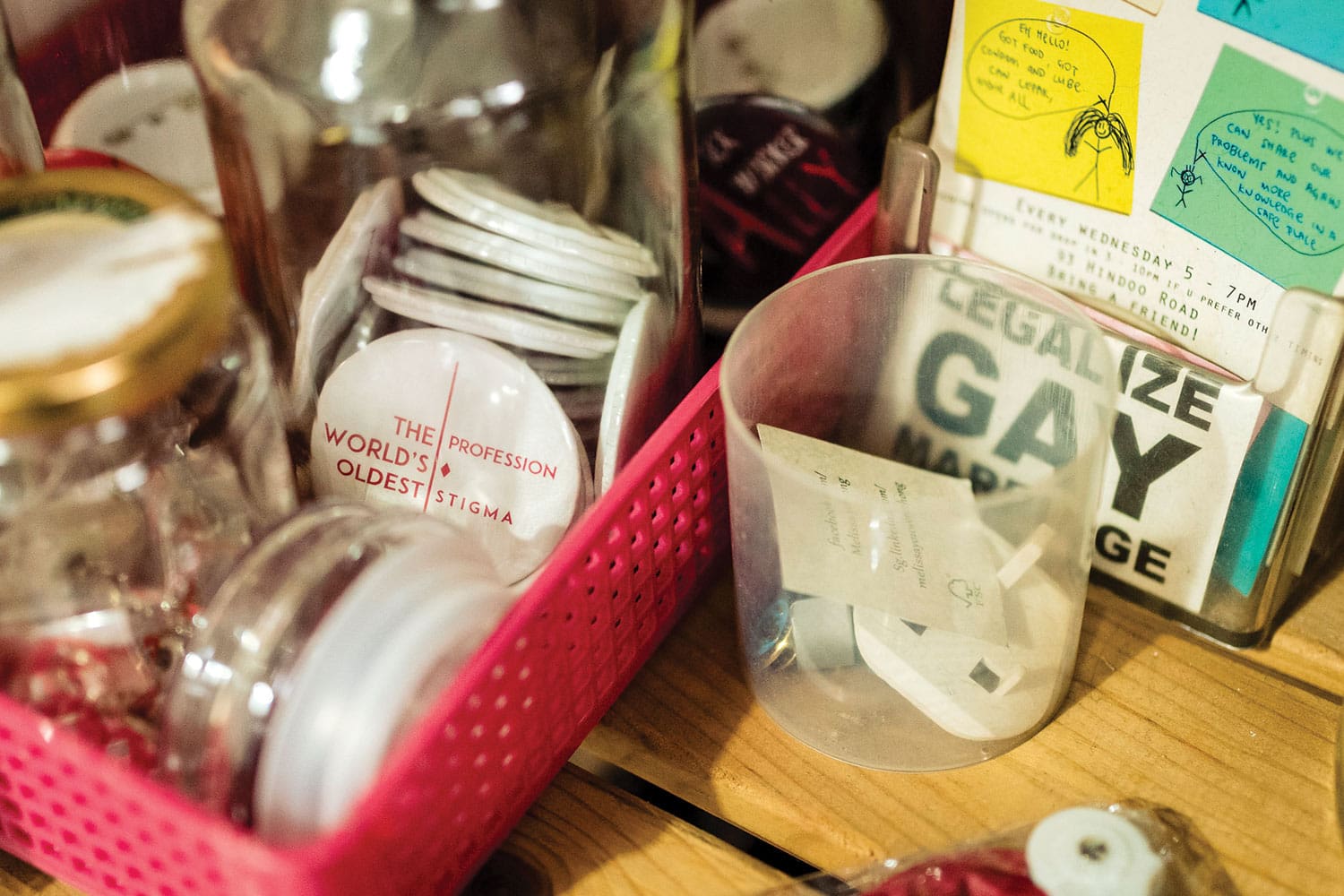
ZAT: It sounds disconcerting that both the police and the perpetrators seem to wield similar power.
VANESSA: Our society looks down on sex workers, so customers and some police officers, as part of society, sometimes look down on them too. We were never taught to challenge our own biases and prejudices. Growing up, I had to unlearn a lot things I was taught since young. I too personally harboured many negative misconceptions about sex workers, until I was equipped with the tools to critically examine the thoughts I had. I recall seeing a curriculum created by a group in the US called Teaching Tolerance, given to schools there. They prepare a curriculum for all ages starting from three years old, teaching people how to confront and identify their own biases, and the ways to overcome them. We don’t even have anything remotely close to that here in Singapore.
ZAT: Is prostitution legal in Singapore?
VANESSA: Prostitution is not legal in Singapore, but it is also not illegal. For it to be legalised, a law must be written that states prostitution is legal, but only under specific circumstances. But now, according to the law, it is illegal to own a brothel, to recruit or solicit a woman for prostitution, and to advertise prostitution services online or through WeChat. So, for all intents and purposes, you cannot do sex work in Singapore legally. However, sometimes, the police do give licences to a few brothels in Geylang and Little India where migrant sex workers work legally. They all have work permits to work here, but their work passes will not indicate their occupation. Another pre-condition is that only women from China, Thailand, Vietnam, Malaysia, and Singapore are allowed to work as sex workers. Here at Project X, we don’t focus on sex workers in licensed brothels as it’s a very protected industry. Instead, we focus on undocumented, indirect, or informal sex workers who come on a one-month tourist pass and do sex work at hotels.
ZAT: What do you think people get the most wrong about the sex work industry?
VANESSA: That sex workers are forced into prostitution; they don’t really want to do it and everyone needs help to get out of the industry. How presumptuous.
ZAT: Hasn’t this opinion caused you issues in terms of getting funding? You approach organisations to raise funds, and they expect you to save these sex workers and get them out of this trade, which begs the question: how do you present your case to them then? They have to first understand and realise that it is a choice. A person doesn’t have to be in peril or in a dire situation to become a sex worker. It can be a difficult bias to overcome.
VANESSA: Yes. It’s an extremely difficult bias to remove—especially with funders that you mentioned. The moment they hear that we don’t rescue these women from the trade, they shut the door in our face. But that’s not going to stop me from finding the right backers who genuinely understand the work we do. There are already people and organisations who support what we’re doing right now, and I am not about to let go of them and pursue others who don’t understand our objectives.
"I often hear people say that sex workers ply this trade because they’re lazy. To these naysayers, I dare them to try being a sex worker for a night, and tell me if this is a job for a lazy person."
ZAT: In an interview, you said that 'in the past, people saw prostitution as a necessary trade. Now it’s viewed more like a black and white morality issue.' Can you elaborate more on how things have changed?
VANESSA: Back in the 1950 and 60s, everyone was poor, and there was widespread and systemic poverty in Singapore. People understood that they had to do anything to survive. If you read 17a Keong Saik Road, the author, Charmaine Leung, wrote about her mum who was a brothel owner, and how there was an emergence of a community at the Keong Saik red light district made up of people who supported each other and looked out for each other’s children. They did what they had to do (prostitution) so that the next generation wouldn’t have to go through the same thing again. Now, the next generation has somehow forgotten everything that has happened in the past, and we judge sex workers harshly and unfairly. There’s just such a horrible amnesia about the history of Singapore.
I often hear people say that sex workers ply this trade because they’re lazy. To these naysayers, I dare them to try being a sex worker for a night, and tell me if this is a job for a lazy person. They say it’s easy money, but is it? Do you know how much preparation goes into one night of work? Even some sex workers I’ve spoken to say it’s easy money. But I know they say that because they’ve adopted the same language they’ve heard from everyone else. And this becomes internalised whorephobia—the hatred of, oppression of, violence towards, and discrimination against sex workers, and by extension, derision or disgust towards activities related to sex work.
ZAT: What’s the worst thing someone has said about the work you do at Project X?
VANESSA: One case immediately jumps to mind and it happened seven years ago. There is a shelter in Singapore run by the nuns of the Good Shepherd Sisters where the police send girls they’ve arrested there. These are usually girls who are underage, trafficked or staying in Singapore as prosecution witnesses. One day, I found myself in a rather terse conversation with a Ministry officer, because I kept asking questions as to why they were treating sex workers so terribly. At one point, out of frustration, the lady officer snapped at me and said, “Why can’t you be more like the nuns from the Good Shepherd Sisters?” I assumed the officer meant that I should focus on rehabilitative work and less on advocacy. A few days ago, I found out that the global chapter of the Good Shepherd Sisters got into a lot of trouble for running sweatshops in their rehabilitation shelters. They also ran Magdalene Laundries where they forced women in the shelters—the very same women they claimed to be helping—to wash laundry for them at a very meagre pay. Subsequently, they faced a lot of international pressure to close these laundries.
ZAT: Why do you think Singapore is lagging so far behind when it comes to human right issues?
VANESSA: Because of this term called Asian Values, which was coined by Lee Kuan Yew and Mahathir back in the 1990s. This term became very powerful both rhetorically and politically. As an ideal, it prioritises economic progress over everything else. The premise is that if people are fed and well-incomed, there would be fewer social problems. If you pay attention to some of the anti-LGBTQ sentiments, there’s always this concern that if everyone is gay, birth rates will plummet, and the economy will suffer. It always comes back to the economy. Whereas human rights are predicated on the individual, Asian values demand that you sacrifice yourself for the greater good. This rhetoric has lasted for the past 50 years. That’s why we’re lagging in all aspects of human rights because nothing else matters in this country other than economic growth.
ZAT: Doesn’t your work become even harder with the lack of understanding of human rights? Essentially, you’re trying to solve both issues: human rights and sex worker rights.
VANESSA: It’s challenging in a fun way. When I was younger, I always had the impression that it was easier to be involved in human rights work in the UK or US because all the processes were already in place. But here in Singapore, you have to get a lot more creative in how you run your advocacy to achieve the social change you want to see. It’s a constant negotiation between strategies and other immediate priorities.
"I believe in building movements and making sure everyone stands in solidarity together."
ZAT: What was the most recent life lesson or advice that you’ve been given that has changed your perspective on how you live?
VANESSA: Recently, I applied and was selected to attend a conference called the American Express Leadership Academy held annually in Singapore. I’ve never regarded myself as a leader, but through the academy, I learnt that I needed to acknowledge and own my role as a leader in the communities that I exist in. That’s how I can truly inspire people. I think I resisted it for a long time because I’ve always felt that my role was never to be a leader, but a community worker that bridges gaps to make life easier for others.
ZAT: As a leader, what does power mean to you?
Vanessa: Power is something that you can be born with or something that is learnt and slowly acquired through life. But it is how you use that power that defines what it means. Everybody has a small slice of power in them, but if we can all come together and harness it, imagine what that can do. I believe in building movements and making sure everyone stands in solidarity together.
ZAT: When you look at the state of the world today, what is the one thing that gives you hope?
VANESSA: I can see that things are changing; many people are trying to do good well and alleviate some of the social problems in this country. By opening up these little pockets of change, I hope it becomes a thunderclap where everybody comes together and affect some social change. I see on Facebook all these amazing events and talks that address a variety of social topics, and it really gives me hope that things will eventually get better for people from the underprivileged classes of society.
****
Edited by Wy-Lene Yap
